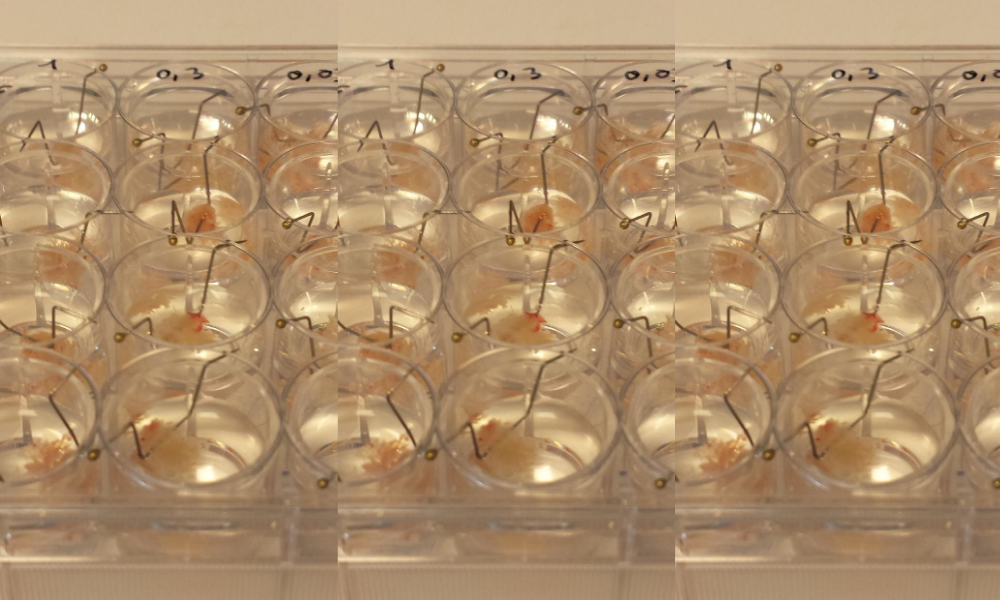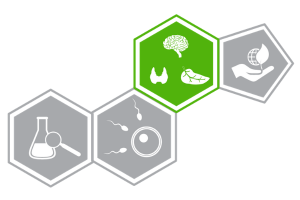
THEME 3

OTHER PHYSIOLOGICAL DISRUPTIONS
Thematic Leader: Cathy Vaillancourt
The aim of this theme is to understand the effects of endocrine disruptors on physiological processes and mechanisms and the impact that perturbations may have on overall health. Areas of research therefore include the effects of endocrine disruptors on the immune system, metabolic and mental health, transgenerational effects and the developmental origins of health and disease. Physiological Disruptions research includes identifying potential health risks to communities with a focus on vulnerable individuals, including mothers and children. Through an ecotoxicological approach, research on this topic also aims to identify the underlying mechanisms and the targets affected by endocrine disruptors.
CATHY VAILLANCOURT’S BIOGRAPHY
Professor Vaillancourt’s research focuses on the involvement of environmental contaminants and stages of pregnancy on the physiology of the human placenta and on the placental dopaminergic, serotonergic, and melatonergic systems. Passionate about ecosystem approaches to health, she also works to better understand the impact of sex on the relationships between the perinatal environment, placental functions, and fetal development.
REGULAR MEMBERS CONTRIBUTING TO THEME 3
To find out more about our members, see the complete list of ICEDA members.
Toxicology of Mixtures. Chemical Carcinogenesis. Risk Assessment. Learn more
Molecular Physiology and Adaptation. Thyroid Function. Learn more
Wildlife Health Assessment. Learn more
Genomics. Genetic Toxicology. Hereditary Mutation. Development and Validation of Biomarkers. Adverse Effects Pathway. Learn more
Toxicology of Pregnancy and Implication of Environmental Factors on the Human Placenta and Fetal Programming. Learn more
Oxidative Stress. Brain Functions. Neurodegenerative Diseases. Pesticides. Learn more
Environmental and Human Toxicology. Molecular Toxicology. Environmental Sciences. Neurodegeneration. Neurotoxicology. Learn more
Pharmacology. Toxicology. Endocrinology. Biology. Human/Animal Health. Metabolic Health. Zebrafish. Mouse Models. Learn more
Invasive Species. Stress. Ectotherm. Metabolomics. Chromatography (GC-MS, LC-MS). Learn more
Ecotoxicology. Olfaction. Pollutants. Insects. Adaptation. Ecophysiology. Insect Endocrinology. Learn more
Endocrine Disruption and Metabolic Disruption of Toxic Substances. Learn more
Toxicology. Molecular Biology. Public and Environmental Health. Community-Based Research. Exposure Assessment and Biomonitoring. Learn more
Endocrinology and Nephrology. Steroid Hormones. Hormone-Sensitive Cancers. Learn more
Molecular Ecotoxicology. Aquatic Nanotoxicology. Learn more
Ecotoxicology. Assessment of the Reproductive Capacity of Fish. Learn more
Disruption of the Immune System.
Cancer. Inflammation. Learn more
Environmental Medicine. Microbiology. Developmental Immunology. Tumor and Viral Immunity. Evolution of Immune Surveillance. Learn more
Ecotoxicology. Comparative Physiology of Metabolism. Metabolic Disease. Inter- and Trans-Generational Effects. Hormones in the Context of Comparative Epigenetics Including Post-Transcriptional Regulatory Mechanisms. Learn more
Epidemiology. Developmental Biology. Biomarker Design and Analysis. Learn more
Ecotoxicology. Molecular Biology. Environmental Risk Assessment. Learn more
Ecotoxicology. Molecular Toxicology. Predictive Toxicology. Species Extrapolation. Ecological Risk Assessment. Learn more
Environmental Toxicology. Comparative Avian Toxicology. Learn more
Genetics, Neurodegenerative Diseases. Learn more
| Ecotoxicology. Learn more |
Hazard Assessment. Developmental Biology. Endocrinology. Learn more
Aquatic Ecotoxicology. Environmental Health. Environmental Contamination. Environmental Risk Assessment. Sex and Gender in the Environment. Environmental Hypersensitivity. Environmental Education. Learn more
Cardiovascular Diseases. Learn more
Environmental Health and Ecohealth Approach. Water, Environment and Health. Political Ecology. Public Policies and Scientific and Social Evaluation Systems. Agrifood Systems and Pesticides. Environmental Sciences, Major Risks and Sociology. Learn more
Investigation of Biological Effects of Environmental Stressors. Environmental Risk Assessment. Development and Application of Bioanalytical Techniques to Assess Environmental Pollution. Aquatic Ecology/Fish Biology. Learn more
Infectious and Immune Diseases. Inflammatory Diseases. Arthritis. Learn more
Toxicology. Reproductive Biology. Molecular Toxicology. Reproductive Health. Thyroid. Gene Expression. Environmental Toxicology. Risk Assessment. Learn more
Aquatic Toxicology. Gene Expression. Molecular Biology. Endocrinology. Biotechnology. Learn more
Environmental and Human Toxicology. in vitro Bioassays. Environment-Immune Interactions in Disease Susceptibility. Nutritional Toxicology. Learn more
Aquatic Ecotoxicology. Molecular Biology. Learn more
Behavioural Neuroscience in Rodents. Hormones. Metabolism. Parental Experience. Environment, Adult Neurogenesis and Plasticity. Aging, Learning and Memory. Learn more
Developmental and Reproductive Toxicology. Environmental Exposures. Environmental Health. Epidemiology. Learn more
Mollusk Biology. Ecotoxicology. Ecological Risk Assessment. Aquatic Toxicology. Soil Toxicology. Learn more
Risk Prevention. Exposure Assessment. Toxicology. Toxicodynamics. Flame Retardant. Electronic Recycling. Learn more
Aquatic Ecotoxicology. Physiology. Energy Metabolism. Transgenerational Effects. Learn more
Aquatic and Mechanistic Toxicology. Long-Term Consequences (Within and Between Generations) of Acute Exposure to Natural and Anthropogenic Chemical Stressors. Effects of Early-Stage Exposure to Endocrine Disruptors. Learn more
Risk Assessment and Risk Methodology. Learn more
Ecotoxicogenomics. Chemical and Environmental Toxicology. Animal physiology. Endocrinology. Molecular Biology. Detection of Endocrine Disruptors Using Cell Lines. Learn more
Biology. Endocrinology. Developmental Biology. Physiology. Metabolism. Genomics. Neuroendocrinology. Reproduction. Learn more
Environmental Toxicology, Endocrinology, Animal Physiology, and Molecular Biology/Toxicology in Vertebrate and Invertebrate Models. Learn more
Environmental Epidemiology. Nutrition. Cancer. Physical Activity. Exposure Measurement. Assessment of Occupational Exposure. Biomarkers. Environment. Life Habits. Genetic. Learn more
Ecology. Biology. Biodiversity. Ecophysiology. Ecoimmunology. Learn more
Cancer and metastases. Breast cancer. Galectin MMP. Galectins. Haematological cancers. Liquid biopsy. Microbiome. Environmental health. Learn more